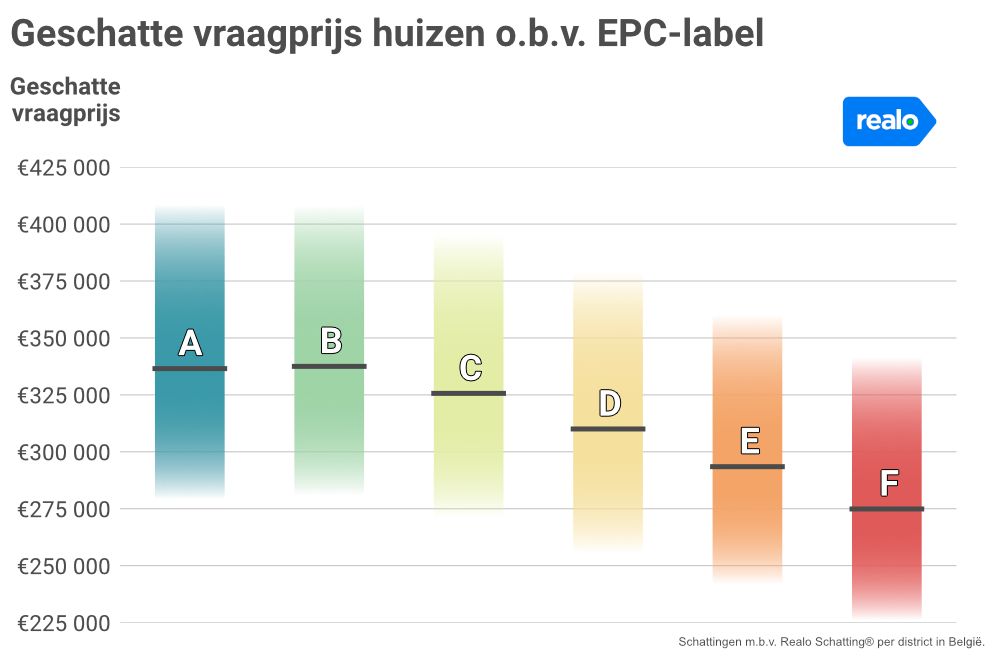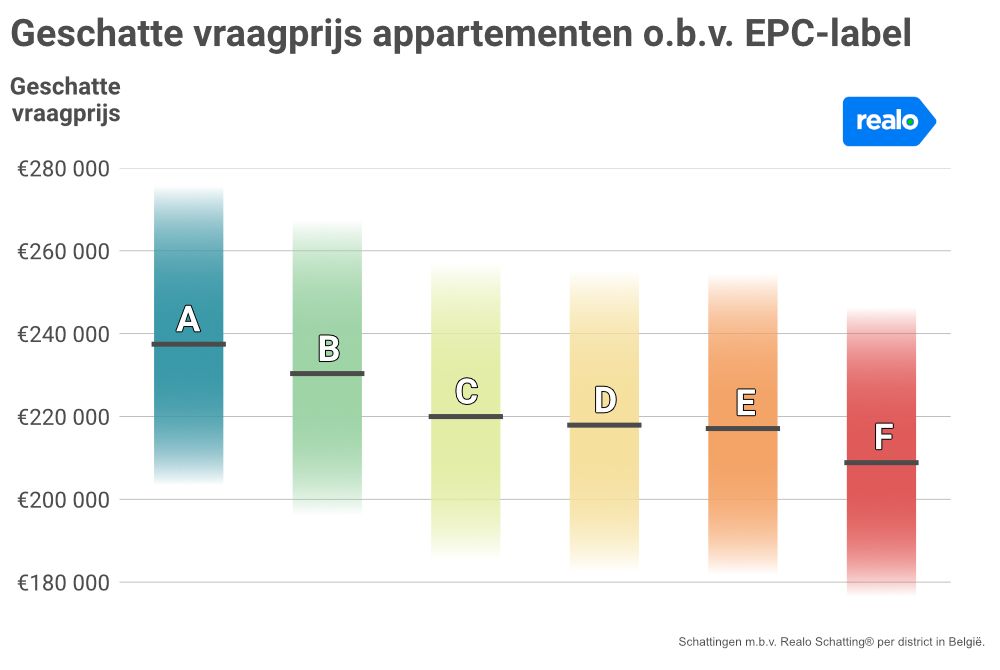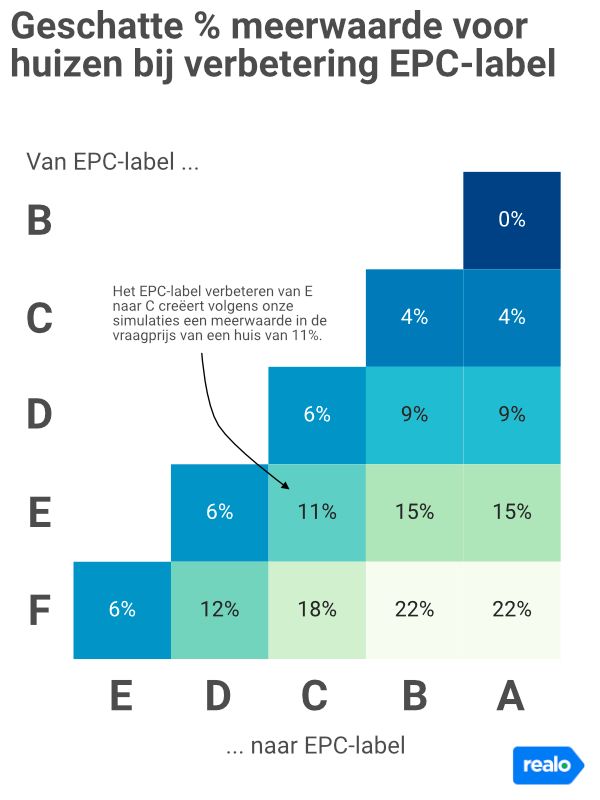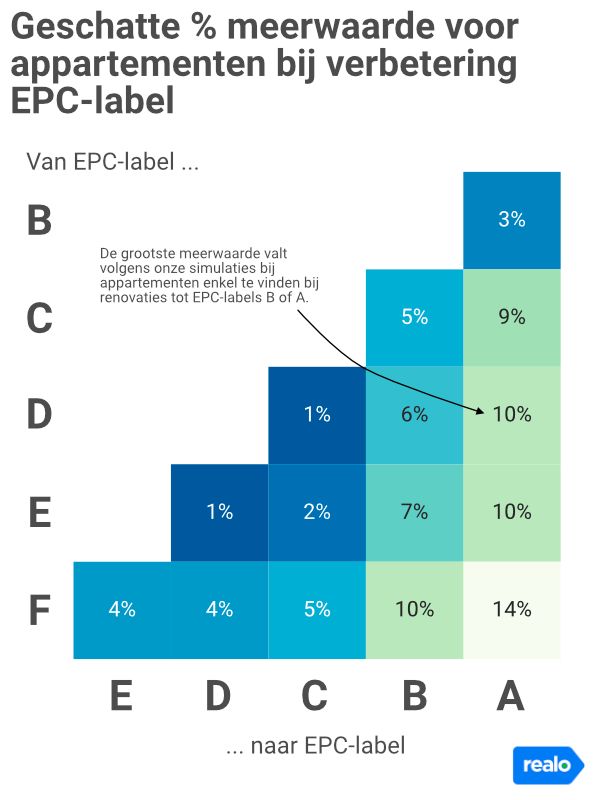Improving EPC does not always bring (the same) return
An energy-efficient house generally costs more. However, using simulations, we show that for houses, improving the EPC score does not add value beyond label B. For flats, on the other hand, there are only gains to be made with the best EPC scores.
Those looking to sell their home today may be asking themselves whether it is worth investing in renovation works first. A key component of this is energy efficiency. Chances are that your house does not conform to the best energy standards, as Belgium is struggling with an ageing housing stock. Several studies in recent years have shown that the EPC score of your home is a determining factor in the asking and selling price. With increasing efforts at European, Belgian and regional level to renew the existing housing stock, the importance of the energy score will only increase. Here, using our estimation tool, we examine how much the asking price increases with an improvement in the EPC label.
Valuate an average home
With Realo's estimation tool, we have an ideal benchmark to simulate how an improvement in the EPC score creates added value on the asking price. The tool uses various variables such as property characteristics and neighborhood characteristics as input to arrive at a realistic estimate of the asking price (read here a more detailed explanation). The more is known about the property, the more accurate the estimate will be.
In a first step, we need to determine what an 'average' property looks like. We look over all the house searches of the last few years and determine what the characteristics of the 'average' house or flat in Belgium are (excluding new-build properties). To study the impact of the EPC score on the asking price, we can then estimate the asking price for that 'average' property, but each time with a better EPC score. Thus, all characteristics of the property remain the same and it is only the EPC score that causes a change in the estimated asking price.

But the average home in Sint-Martens-Latem will look very different from the average home in Oostakker. Moreover, the mobility score or the presence of greenery or industry can vary greatly from area to area. Therefore, we can do the same exercise as above, but for each neighbourhood in Belgium separately. In this way, we obtain a more nuanced estimate of the impact of EPC scores on the asking price.
Going from B to A
What is immediately noticeable when looking at the simulation for houses is that estimated prices go up nicely with a better EPC label, but that increase stops abruptly after a label B (fixed at 150 kWh/m2/year in our simulation). In other words, investing in a renovation that takes your house from label B to A will generally no longer have an impact on the asking price.

According to Thomas Valkeniers, CEO of real estate group Living Stone, this is not so surprising. "A house with a label B is already a very economical house. The works you have to do to go from B to A are disproportionate to the final added value. You don't have to try to turn something that is almost perfect into something perfect to find a willing buyer."
More interesting for future sellers is the observation that for houses with a poorer EPC score there is profit to be made with renovations. Those who currently live in a house with an energy score of 550 kWh/m2/year and invest in roof insulation, for example, can expect an average increase of 22% on the asking price, according to our estimates.
Other recent reports have reached similar conclusions, albeit based on different data and methods. Belfius recently estimated the added value of from a label F to a label B at 29%. Here, too, no difference was found in the asking price between homes with label A or B. In the most recent economic review of the National Bank of Belgium the surcharge was estimated at 21.5% between labels F and B (based on data between 2020 and 2021). Our estimation tool works on the basis of the latest available data and thus follows the most recent trends in the real estate market in Belgium.
Important to know is that it is not yet mandatory to renovate the house to an A label when selling or transferring. If this were to change in the future, it could affect asking prices. Houses that already meet the A label will probably still increase in value, while houses above 100 kWh/m2/year may fall in value, because in that case account must be taken of future renovation works in the budget.
Lower energy consumption distorts preferences
For flats, on the other hand, the pattern is quite different, where almost no added value can be found between labels E to C. Only below C (less than 300 kWh/m2/year) do our simulations indicate jumps in added value.

Because apartments already have lower consumption on average, the EPC score may play less of a role for buyers. A 2019 study by KU Leuven found that the energy expenditure of apartments in Flanders was on average 20% lower than that of houses. Compared to houses, the EPC score also weighed less on the price of apartments. Again, little difference was found between mid-range labels (D and E). Our simulations seem to suggest that energy consumption only really plays a role in the asking price when the EPC score is clearly better than what can be expected on average from an apartment.
How exactly these improvements can be made is unfortunately less obvious for flats. Valkeniers of Living Stone again: "It is more difficult to have an impact on flats, because a large part of the energy efficiency depends on whole-building factors, such as roof insulation." For example, the same KU Leuven study found that the quality of the entire apartment building had a greater impact on the selling price than the quality of the individual units.


What now?
Making your property more energy efficient for sale can therefore create significant added value in some cases. But from your estate agent, you don't have to expect a recommendations report, according to Valkeniers: "As estate agents, we are not going to make specific recommendations, that is the work of an EPC expert. But in individual cases, we can motivate to make certain improvements. For example, if someone has a 15-year-old boiler, we can suggest replacing it anyway."
To the EPC expert, then. Since 2022, it has been compulsory in Flanders to present an EPC certificate drawn up from 2019 when selling or renting out a house. Such a certificate is drawn up by an EPC expert who visits your home to measure the energy efficiency of different parts of the house. This mainly looks at the insulation of roofs, windows, walls, doors and floors and the energy efficiency of the heating system.
Alexander Willems, EPC expert and manager at real estate office Claes & Willems, advises: "Insulating the roof is the most important first step. You do the rest when you get the chance or have the budget to adjust." Specifically, based on figures from the Insulation Barometer 2020: for a house with an initial energy score of 730 kWh/ m2/year you can book an energy profit of 376 kWh/m2/year. Insulating the outer walls provides an additional gain of another 81 kWh/m2/year. But Willems warns: "Choices you make in the first phase can influence later steps. For example, if you adjust your roof and place the windows, you have to do the necessary to make the house airtight and place to provide for a ventilation system. If you don't do that, you will never be able to drop to an A label later."
An EPC certificate will also always state which improvements can be made. These recommendations are based on the objective of having an average energy consumption of 100 kWh/m2/year by 2050 across the entire housing stock in Flanders, i.e. a label A. Specific recommendations in the certificate mainly focus on on improved insulation, but those who want can also, for example, invest more in solar energy or better ventilation in order to achieve a better EPC label.
All those adjustments do not have to break the piggy bank, according to Willems. “For example, there are energy loans at 0% and a whole range of premiums, so you can spread the costs.” A study by iVox however, found that half of those surveyed could not find information about premiums easily and the majority found the information too complex. However, there are many tools available online. Finally, we provide some links to help you on your way: